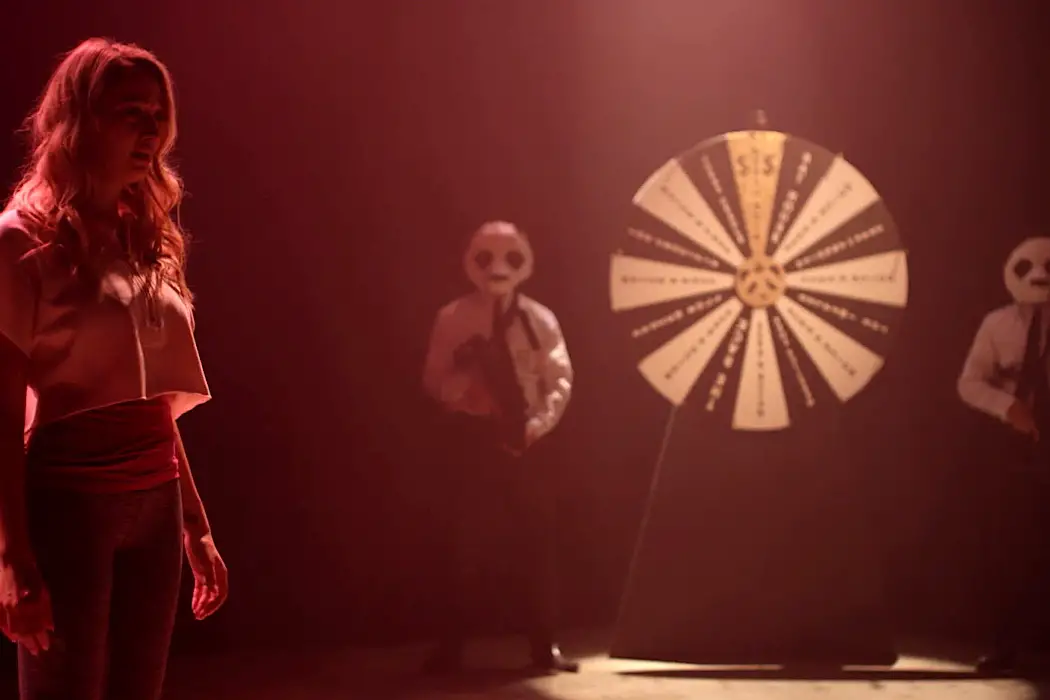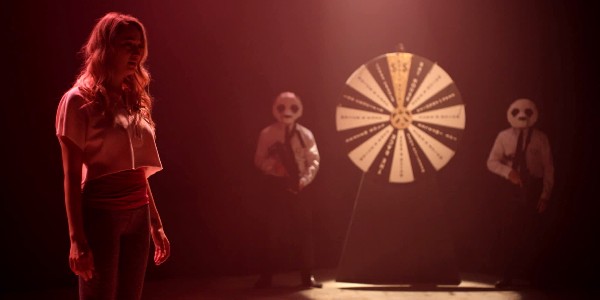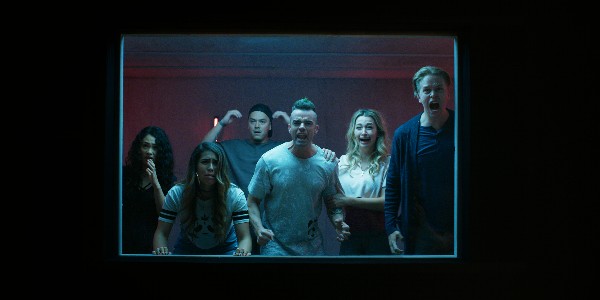FUNHOUSE: Gory Satire of Reality TV Comes Up Short

Amanda Mazzillo is a writer with an MFA in Dramatic…
Funhouse, directed and written by Jason William Lee, follows a group of D-list celebrities competing on a new reality show that takes its challenges to the extreme.
The group consists of Kasper Nordin (Valter Skarsgård), the ex-husband of pop star Darla Drake (Kylee Bush), Ximena Torres (Gigi Saul Guerrero) a tabloid blogger, Lonni Byrne (Khamisa Wilsher) a contestant on a Bachelorette style reality show, James ‘Headstone’ Malone (Christopher Gerard) an Irish MMA fighter, Ula La More (Karolina Benefield) an Instagram model type, Cat Zim (Amanda Howells) a chess prodigy and previous star of The Real Wiccans of Westchester, Dex ‘El Shocker’ Souza (Mathias Retamal), a rapper who feels of the Soundcloud variety, and lastly Nevin Evensmith (Dayleigh Nelson) a Youtuber who ranks other people’s viral videos.
The reality show is hosted by a voice-altered cartoon Panda as a front for an absurdly wealthy tech guy, Nero Alexander (Jerome Velinsky) who wants to prove that reality television and instant celebrities have made our world desire over-the-top gore and violence by making his own reality show which features over-the-top gore and violence.
Satire of Reality Television
Throughout the film, relationships develop between the group, but Funhouse misses out on the real potential of alliances and the drama which stems from that by making its horror obvious to everyone inside the house.
Funhouse is not saying nearly as much about reality television and the celebrities the genre creates as it thinks it is. Commentary on how people have become desensitized to violence is something that has been explored many times, and Jason William Lee is not adding anything new to the conversation with Funhouse.

As I watched Funhouse, I felt that its main goal was to be a satire of reality television, but there are no distinct moments connected to this that made me laugh. I laughed one time during the film and it was the first time Headstone called Kasper a ghost and he responded by stating that they didn’t have the cartoon in Sweden and recommended Moomin.
This moment gave a glimpse into the characters and started an interesting development between the two that could have lead to some moments of reality tv satire dealing with building alliances, even with the knowledge that both could not survive.
In the introductions to each character, we see glimpses into how they became celebrities. This montage of Youtube videos and reality tv introductions sets a welcome tone for the satire, but quickly this fades away, and some of the careers shown here barely come into play throughout the film. There was comedic potential in seeing their past experiences, but some were outright forgotten.
Gore Above Suspense
The satire does not land well because it is caught up with thinking that simply stating this idea about the nature of violence and gore is enough to hold up the film and make the audience scared or contemplate their own interest in seeing violence on screen.
Making the desensitization to violence the focus of a horror film centered around death scenes built to be gory above all else also gives the film a shallow tone. The moments of gore in Funhouse feel built around shock value instead of actually wanting to scare the audience, and even in this regard, the gore is not original or interesting.
In addition to the satire falling short, the horror aspects of Funhouse were too reliant on torture and gore and did not have enough of a focus on building frightening moments through the story and suspense.

The structure of Funhouse works to mimic a reality competition series but fails to capture the horror of the film’s premise. By showcasing the results of the public voting, Funhouse eliminates some of the suspense. We always know who is going to die, so nothing comes as a surprise.
There is also little surprise over who is responsible for this life-or-death reality show because we are shown who he is in the film’s opening scene. Starting the film with a scene from a past instance of this same person torturing a previous group is a nice way to build up the gore, but showing exactly who is responsible when they are hidden behind a cartoon panda for most of the film feels a bit lacking.
I do feel the film tried to develop the different characters, so we could feel connected to them and want them to succeed, especially with Kasper and Headstone. Christopher Gerard as Headstone gave the most memorable performances and made his character likable that when we see him forced into fighting inside the ‘funhouse’, we care what happens to him.
Kasper is the first character we really get to know establishing him as the protagonist, and this allows him to be given more moments that explore who he is and where he came from. Valter Skarsgård does well to make his ex-pop star who was famous only for who he married feel like the character the least interested in being a celebrity.

These moments of development make Funhouse a slightly better film, but too much of its characters are not given the moments they need to shine. Gigi Saul Guerrero does well with her tabloid blogger character, and I was looking forward to the interactions between her and Kasper when we learn her reporting was in part responsible for his divorce, but not much came of this reveal.
In addition to some of the death scenes being overused gore such as The Rack, others were so far removed from horror they felt close to parody–a life-or-death game of concentration and a game of chess played on a giant board you’d find in the park–, but taken too seriously to really feel as if the filmmakers were satirizing the violence of SAW inspired horror films.
Conclusion
Funhouse wants to be seen as a clever take-down of violence and reality television but does not quite hit the mark in either area, but certain characters including Skarsgård’s Kasper, Gerard’s Headstone, and Guerrero’s Ximena are given a little more background which leads to performances which give sympathy and emotion to their characters.
Does the idea of a horror film set within a reality television show interest you? Share your thoughts in the comments?
Funhouse released on May 28th in the US.
Does content like this matter to you?
Become a Member and support film journalism. Unlock access to all of Film Inquiry`s great articles. Join a community of like-minded readers who are passionate about cinema - get access to our private members Network, give back to independent filmmakers, and more.
Amanda Mazzillo is a writer with an MFA in Dramatic Writing from SCAD and a BA in Writing & Linguistics and Film Studies minor from Georgia Southern University. She enjoys writing comedy and exploring all forms of media. Her Twitter name is a bad pun: @mazzillofirefox













